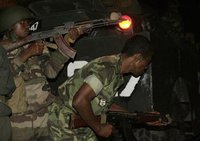Côte d'Ivoire: War on the brink of extinction
 The military men loyal to the President of Côte d'Ivoire Alassane Ouattara, whose legitimacy is formally recognized by the UN, on Wednesday, after several days of fighting, have entered into the country's political capital Yamoussoukro. Simultaneously, the UN Security Council announced sanctions against the government of rebel President Laurent Gbagbo.
The military men loyal to the President of Côte d'Ivoire Alassane Ouattara, whose legitimacy is formally recognized by the UN, on Wednesday, after several days of fighting, have entered into the country's political capital Yamoussoukro. Simultaneously, the UN Security Council announced sanctions against the government of rebel President Laurent Gbagbo.

It must be said that in the recent days the confrontation between the rebels and government forces in Côte d'Ivoire has become more acute. The number of victims of the collision has been growing. As a result of a missile strike alone produced by the forces loyal to President Laurent Gbagbo in the suburb of the economic capital of Abidjan, 25 people were killed and 45 were wounded. Artillery fire has caused destruction of dozens of houses and shops.
The UN Council on Human Rights (UNHCR) has described the situation in Abidjan as a "war in the city." The wave of refugees trying to escape from the zone of military operations into the areas that are still considered relatively safe is of a particular concern. Within several days the number of refugees exceeded 300 thousand.
Neither side sees a possibility of a political settlement of the conflict. Both sides are increasingly more inclined to use violent methods to resolve it. The army and police are particularly cruel in dispersing rallies and picketing conducted by the supporters of Alassane Ouattara recognized by the international community as president. On March 4, 2011 in Abidjan seven women who participated in antigovernment rallies were killed. Several hundred protesters chanted "Allasane - President!" and "Gbagbo get out!".
Meanwhile, the insurgents attempted to attack the city in mid-March. A fierce firefight near a military base was heard on the outskirts of Abidjan. Yet, supporters of Ouattara, apparently, have not achieved decisive success. The rebels lead the offensive in the west, near the border with Liberia. The number of refugees in these areas has reached 75 thousand people.
The U.S. and EU, despite the difficult political situation in Côte d'Ivoire, are inclined to support Ouattara, while isolating Gbagbo and his supporters who refuse to surrender their powers.
Among European countries, France is trying to play the most active role in resolving the conflict. Côte d'Ivoire was in possession of the French for several decades (until 1960). Recently, the Foreign Minister Alain Juppe wanted the UN peacekeeping force in Cote d'Ivoire to play a more significant role, recalling that their mandate will "allow using force" under the circumstances where armed clashes have spread over the country.
African Union also tends to support the president-elect Ouattara. According to the French media, Gbagbo, who is already in a difficult position, has recently lost the support of its only ally in the region.
Against the backdrop of the Ivorian crisis, Angola has joined the African Union position. This position, worked out by the heads of five African nations, implies the need for a national unity government led by Alassane Ouattara, Radio France Internationale recently reported.
Despite the fact that the EU countries unreservedly support the opposition leader, it was too early to talk about a substantial weakening of the regime until yesterday. Local successes achieved by the rebels were not the indicators of the close win over supporters of Gbagbo, retaining the south of Côte d'Ivoire.
Meanwhile, economic sanctions, such as an embargo on exports of cocoa, may cause irreparable damage to the economy of this small African country. UN envoy Emilia Kazela fears a humanitarian catastrophe in Côte d'Ivoire. She urged the donors to seriously think about the fact what they should pay attention to all crisis situations in the world.
Anyway, the actions of the U.S. and the EU supporting Ouattara have not yet helped to resolve the Ivorian crisis. Residents of Abidjan are more willing to join the supporters of Gbagbo than support international sanctions that are considered as an attempt to interfere in the internal affairs of Cote d'Ivoire.
The population of this troubled African country suffers the most from the political ambitions of the two presidents. The civilians who did not wish to become parties to the bloody civil strife have nowhere to run. Neighboring Liberia is struggling to cope with the problem of accommodation of refugees whose number is only growing day after day.
The confrontation in Côte d'Ivoire could drag on for months if not years. Although in light of recent events in favor of Ouattara his strengthening can be final and irreversible.
Yuri Sosinsky-Semikhat
Pravda.Ru
Subscribe to Pravda.Ru Telegram channel, Facebook, RSS!


